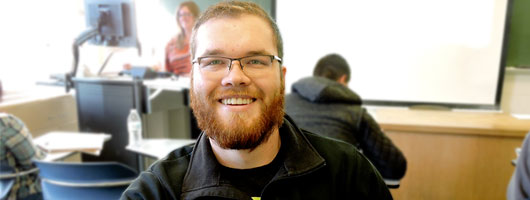 Pictured | James Dishman | Clinical Laboratory Science | Rochester, Indiana (hometown)
Pictured | James Dishman | Clinical Laboratory Science | Rochester, Indiana (hometown)
Bachelor of Science in Clinical Laboratory Science
Clinical Laboratory Science is Indiana University South Bend’s answer to the Medical Laboratory Science needs of the Michiana Region. Providing entry-level preparation for work in the clinical laboratory performing procedures on patient-derived biological specimens. Clinical laboratory personnel are categorized according to specialty areas: blood banking, chemistry, immunology, hematology, microbiology, and phlebotomy. Students participating in this program will train in the newly renovated Riverside Hall laboratory science facility and work with clinical experts at local clinical affiliates.
Clinical Laboratory Science Concentration Objectives
In order to fulfill the requirements of a Bachelor Degree in Health Sciences with a concentration in health promotion and promote the overall program goals,
graduates of the Health Sciences degree at Indiana University South Bend will be able to:
- Synthesize the fundamental biological sciences necessary for integration into clinical laboratory diagnostics
- Have entry-level professional knowledge in the most common areas of the clinical lab, including Hematology, Clinical Chemistry, Urinalyses, Clinical Microbiology, and Blood banking
- Understand the professional, ethical, and practical responsibilities of laboratorians in the interdisciplinary health care team
- Be prepared to sit for the national certification exam offered through the ASCP BOC
Academic Advising
College policy on advising requires that students meet with their academic advisors at least once each year, and in some departments, prior to each semester’s to enrollment. Advising holds are placed on all Vera Z. Dwyer College of Health Sciences students prior to advance registration and are released following advising
appointments. Students with a declared major are advised in their academic units. To determine who your advisor is and how to contact them, see One.IU.
Degree Requirements (120 cr.)
Degree Map >>
Students receiving the Bachelor of Science in Clinical Laboratory Science must complete 120 credits including:
- IU South Bend Dwyer College of Health Sciences Campuswide General Education Curriculum (18 cr.)
- Biomedical Sciences Requirements (50 cr.)
- Major requirements (52 cr.)
- Major courses in the B.S. in CLS will begin with CLS-L 201 (also open to non-majors).
- Students are required to apply officially to the program upon completion of their prerequisite courses and the majority of their co-requisite courses, typically during the summer between their sophomore and junior year.
Major Requirements (52 cr.)
All courses are 3 credits, unless otherwise designated.
- CLS-C 405 Clinical Chemistry
- CLS-C 406 Chemistry Methods (2 cr.)
- CLS-C 407 Hematology
- CLS-C 408 Hematologic Methods (2 cr.)
- CLS-C 415 Advanced Clinical Chemistry: Molecular Diagnostics and Special Chemstry (pending approval)
- CLS-C 417 Advanced Hematology and Cancer (pending approval)
- CLS-E 401 General Externship (5 cr.) (taken twice) (pending approval)
- CLS-I 407 Serology and Immunohematology
- CLS-I 408 Serologic Methods (2 cr.)
- CLS-I 417 Advanced Diagnostic Immunology, Transfusion and Autoimmune Disease (pending approval)
- CLS-L 201 Introduction to the Diagnostic Laboratory
- CLS-L 420 Urinalysis (2 cr.) (pending approval)
- CLS-M 250 Clinical Laboratory Management, Ethics and Policy
- CLS-M 403 Clinical Microbiology
- CLS-M 404 Microbiological Methods (2 cr.)
- CLS-M 411 Mycology/Parasitology (2 cr.) (pending approval)
- CLS-M 413 Advanced Clinical Microbiology (pending approval)
Photo credit | Teresa Sheppard